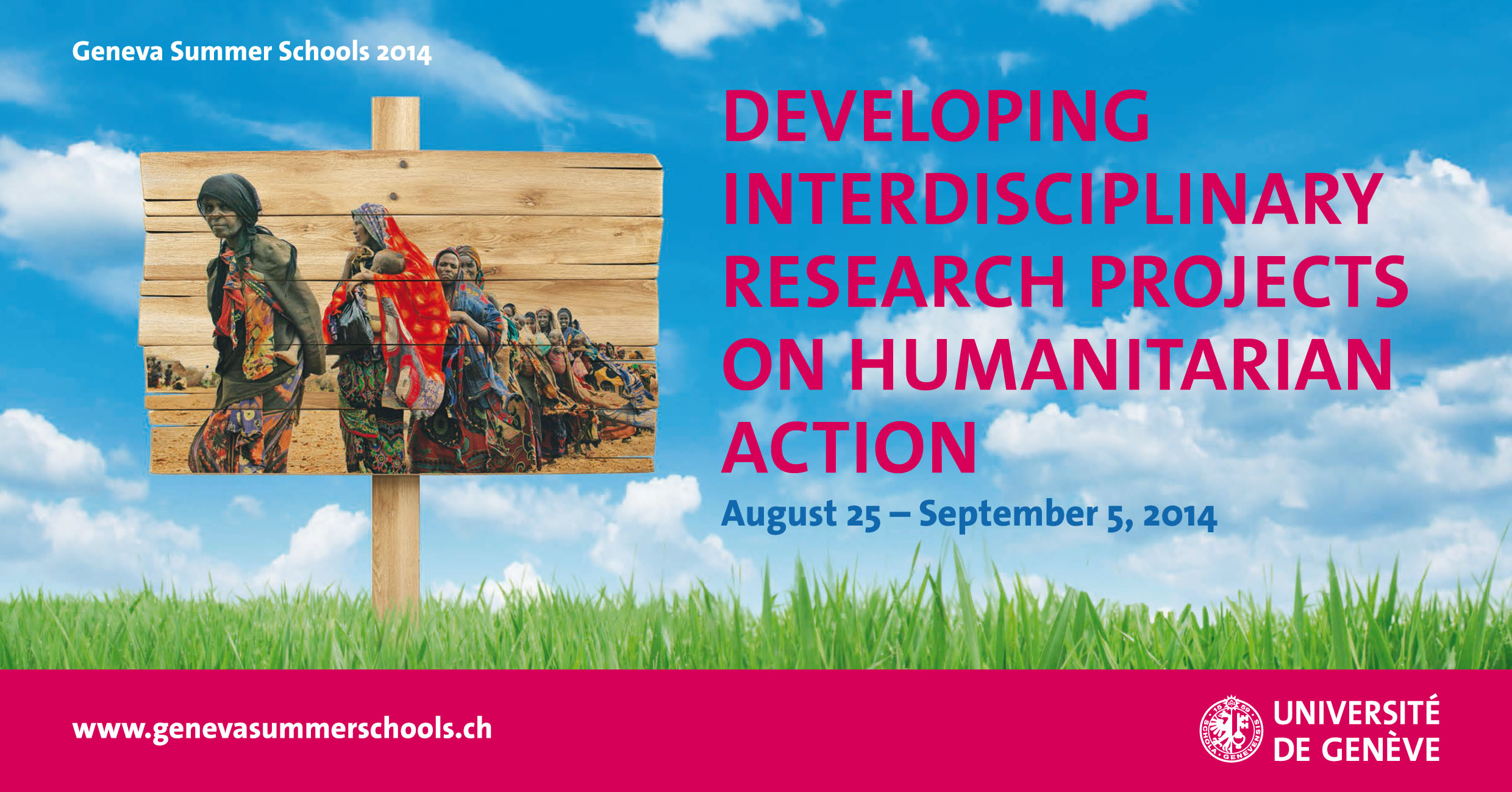
THE WEBSITE FOR THE 2015 EDITION WILL BE ONLINE HERE IN mid DECEMBER.
PLEASE VISIT US AGAIN and sign up for our Newsletter to be informed when course enrollment opens.
"GET AN OPPORTUNITY TO DEVELOP YOUR RESEARCH PROJECT IN THE FIRST INTERNATIONAL SUMMER SCHOOL ON RESEARCH IN HUMANITARIAN ACTION"
"LEARN WITH COLLEAGUES AND EXPERTS ABOUT INTERDISCIPLINARY RESEARCH, METHODS AND ETHICS IN HUMANITARIAN SETTINGS"
This summer school will allow researchers and practitioners involved in the humanitarian field to develop and critically analyze their own research project. The purpose is to encourage and share critical reflection on doing research in the humanitarian field, which necessarily draws on various disciplinary approaches. Theprogrammeis structured along three main themes representing cross-cutting issues for research in humanitarian settings. Each of these themes will be developed in modules of several days, which will give the opportunity to the participants to learn from expert practitioners and scholars and to develop and criticize their own research project through interactive workshops in front of the class.
1) Theme 1: Using an interdisciplinary approach in research on humanitarian action (3 days)
In the last decades, research on humanitarian action has often been limited to disciplinary approaches that focused on certain angles and aspects of humanitarian crises. However, the current contexts (armed conflicts, epidemics, “natural disasters”, social exclusion) in which humanitarian interventions unfold are more diverse and complex than ever. This requires a better understanding of the political, economic, social, ideological, anthropological, and medical factors that play a role in the unfolding of a humanitarian crisis and its consequences.
The first module will deepen these aspects through:
- Examining the epistemology of disciplinary research in general and more specifically in humanitarian settings;
- Understanding how to move from a disciplinary to an interdisciplinary approach;
- Learning from case studies illustrating the different meanings of an “interdisciplinary approach”: interdisciplinary conceptual framework, interdisciplinary methodology or shared disciplinary perspectives to address an interdisciplinary research question.
2) Theme 2: using qualitative as well as quantitative methods to measure and evaluate humanitarian interventions (3 days)
A third module will focus on various methodological approaches for research in humanitarian settings. It will allow participants to better understand how different qualitative and quantitative methods, both from social sciences and natural sciences, can be used to measure and evaluate humanitarian interventions. This module is not dedicated to acquiring any specific methodological skills. It rather aims at exploring how to use and compare quantitative evidence and qualitative interpretations.
The second module will deepen these aspects through:
An overview of existing quantitative and qualitative methods and how they are adapted or not for humanitarian settings;
- Defining the difference between doing a research and doing an evaluation;
- Examining the practical implications and the methodological choices related to the study of the impact, the effectiveness, the feasibility or the perception of humanitarian action;
- Determining the methodological approaches best adapted to the temporality of the research topic (past, present or future) and the comparative approach;
- Learning from several case studies on methodological approaches used in the humanitarian field, such as the evaluation of the Winning Hearts and Minds project in Afghanistan, new (qualitative?) field methods and the use of big data in research on humanitarian action.
3) Theme 3: Ethics of research and position of the researcher in fragile contexts (3 days)
Frequently research on humanitarian action is carried out in resource-constrained countries involving fragile populations. There is general agreement that research involving human subjects carried out in emergency and disaster situations must follow highest ethical standards. While such research has to abide by the ethical principles governing all research on human subjects, some issues merit special attention such as enhanced vulnerability, community involvement, harms and benefits to the conflict- or disaster-stricken population, informed consent of individuals and communities.
The third module will deepen these aspects by examining:
- Ways to improve ethical oversight of research in humanitarian settings drawing on practical experiences of researchers and organizations;
- How to apply ethical criteria mainly discussed in health-related research to all fields of research;
- The position of the foreign researcher including proximity vs. distance in his/her relation with the research topic, and how the misconception of research as humanitarian aid can be avoided;
- Several case studies on how to do ethically responsible research in fragile contexts and/or with vulnerable populations.
The faculty is composed of teachers from the University of Geneva and the Graduate Institute with a long experience in methodology training and research. The CERAH is also inviting scholars from other academic centres in Europe and North America.
Professor Doris Schopper
Director, Centre for Education and Research in Humanitarian Action
Professor, Faculty of Medicine, University of Geneva
Dr. Valerie Gorin
Lecturer and researcher
CERAH
Faculty list to be posted in early 2014.
The course is aimed at students who are starting a PhD or are already working on a PhD thesis, and experienced practitioners who are developing a research project on humanitarian action. The course is taught in English.
We encourage applications from PhD students and practitioners coming from a large diversity of disciplines: social sciences, economic sciences humanities, arts, medicine. Research projects can either address humanitarian interventions (roots and dynamics of humanitarian crises, responses to disasters, armed conflicts or peace-building), or analyze humanitarian action in itself (professionalization, sociology of actors, dilemmas, etc.).
Applications will be selected on the basis of these following compulsory criteria:
- An extended outline of the research proposal (5-6 pages), including the rationale and the methodological outline.
- Reasons for applying to the course and how this will potentially benefit the participant’s research project.
- A description of the expectations for the summer school, including methodological issues the participant would like to explore and discuss.
Not accepting applications.


